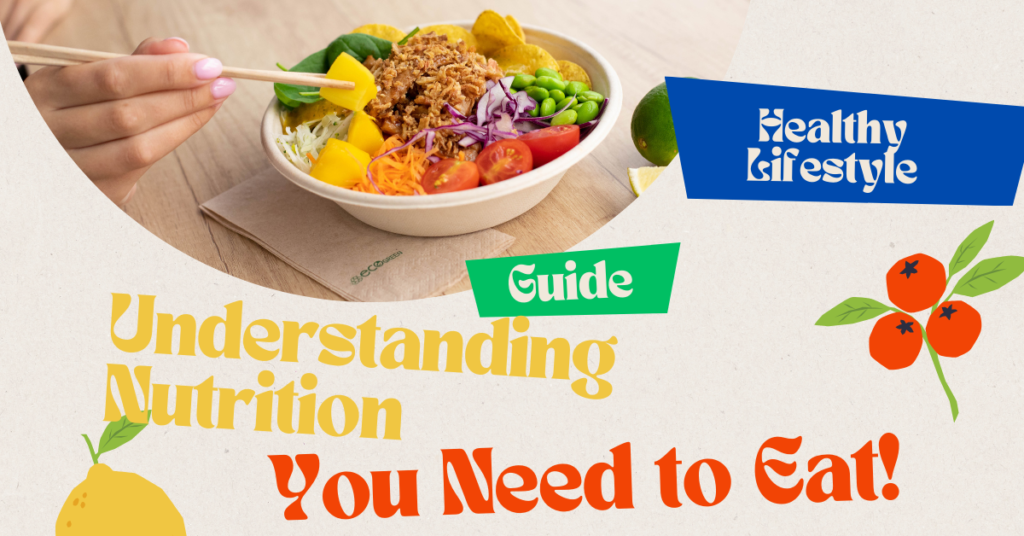Introduction
The foundation of health and wellbeing is nutrition. It includes what we eat and how our bodies use the nutrients in it to perform at their best. It’s more important than ever to grasp the foundations of nutrition in today’s fast-paced environment. The fundamentals of nutrition, the advantages of a balanced diet, and useful advice for choosing better options will all be covered in this article.
What is Nutrition?
The process by which our bodies absorb and use food for energy, development, and repair is referred to as nutrition. It includes a range of nutrients that are essential for sustaining biological processes, such as:
- Macronutrients: These are the primary sources of energy and include carbohydrates, proteins, and fats.
- Micronutrients: Vitamins and minerals that support various bodily functions and are essential for overall health.
- Water: Often overlooked, hydration is crucial for maintaining bodily processes.

1. Macronutrients: The Building Blocks of Nutrition
Carbohydrates
Carbohydrates are the body’s main energy source. They are categorized into two types:
- Simple Carbohydrates: Found in fruits, milk, and sweeteners. They provide quick energy.
- Complex Carbohydrates: Present in veggies, legumes, and whole grains. They are rich in fiber and offer long-lasting energy.
Proteins
Proteins are necessary for immune system function, tissue repair, and growth. Amino acids, some of which are necessary and must be supplied through diet, make up their composition. Among the best places to get protein are:
- Animal products: meat, fish, eggs, and dairy.
- Plant-based sources: beans, lentils, nuts, and tofu.
Fats
Fats are essential for the synthesis of hormones, the absorption of nutrients, and the protection of key organs. Three primary categories of fats exist:
- Saturated Fats: Found in animal products and some oils. They should be consumed in moderation.
- Unsaturated Fats: Found in olive oil, avocados, and fatty fish. These are beneficial for heart health.
- Trans Fats: Found in processed foods. These should be avoided as they are linked to various health issues.

2. Micronutrients: Essential Vitamins and Minerals
Minerals and vitamins are essential for immune system performance, energy production, and bone health. Here’s a quick rundown:
Vitamins:
Water-soluble (B vitamins, vitamin C) and fat-soluble (vitamins A, D, E, K). Each vitamin has unique benefits, such as supporting metabolism and maintaining skin health.
Minerals:
Include calcium, potassium, iron, and magnesium. They play roles in bone health, nerve function, and muscle contraction.

3. The Importance of Hydration
Water is vital for survival. It aids digestion, regulates body temperature, and transports nutrients. Aim to drink at least 8 cups (64 ounces) of water daily, adjusting for activity level and climate.
Benefits of a Balanced Diet
1. Weight Management:
A balanced diet supplies the proper amounts of nutrients without going overboard in terms of calories, which aids in maintaining a healthy weight.
2. Improved Mood:
There are foods that improve brain clarity and mood. For example, omega-3 fatty acids have been associated with decreased depression.
3. Reduced Risk of Chronic Diseases:
Diabetes, heart disease, and some types of cancer can all be prevented with a diet high in nutrients.
4. Enhanced Physical Performance:
Having a healthy diet helps you recover from workouts and improves your athletic performance.
Tips for Healthy Eating
1. Plan Your Meals
Making healthier decisions can be aided by meal preparation. Set aside some time each week to cook a range of nutrient-rich meals. This lessens the desire to choose harmful alternatives.
2. Incorporate Whole Foods
Give priority to eating whole, unprocessed foods like vegetables, fruits, whole grains, lean meats, and healthy fats. These foods offer important vitamins and minerals and are high in nutrients.
3. Read Nutrition Labels
Making educated decisions can be aided by your understanding of nutrition labels. Seek for foods that have less sodium, added sugars, and bad fats. Look for goods that list all of the ingredients.
4. Practice Portion Control
Pay attention to portion proportions to prevent overindulging. Limiting portion sizes and avoiding overindulgence in calories can be achieved by using smaller dishes and bowls.
5. Stay Hydrated
Water is your best beverage throughout the day. Our body might occasionally mistake thirst for hunger, which causes us to overindulge in snacks.
6. Limit Processed Foods
Processed foods frequently have high sodium, sugar, and harmful fat content. When it comes to your diet, try to limit these and whenever feasible, concentrate on whole foods.
Conclusion
Being aware of nutrition is crucial to living a healthful lifestyle. You may increase your physical performance, lower your chance of developing chronic diseases, and improve your general well-being by concentrating on a balanced diet high in macronutrients and micronutrients. Keep in mind that even minor adjustments might have a big impact on your health. Begin by planning your meals, drinking plenty of water, and increasing the amount of whole foods in your diet. Your body will be appreciative!
Call to Action
Are you prepared to take charge of your health? Assess your present eating patterns to see where you can make changes. For individualized nutrition guidance, think about speaking with a certified dietitian. Take the first step toward improved health right now!


